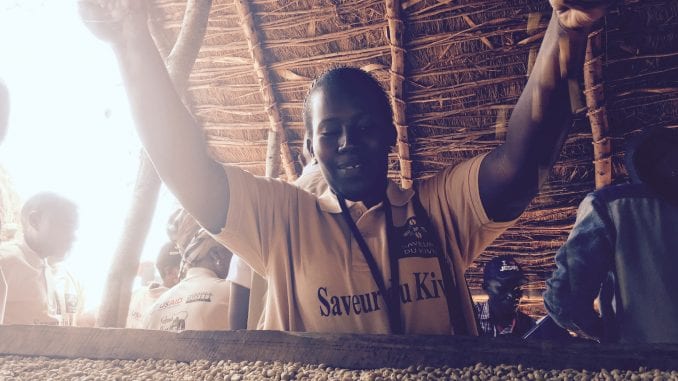
The Democratic Republic of the Congo has suffered a sharp decrease in coffee production due to war and violence. Now, it’s looking to rebuild and create systems to promote production and quality.
There are coffee regions we know well, but there are regions where violence, accessibility, and poverty have detrimentally affected coffee production. In this ongoing series, we’ll highlight different coffee-producing countries and discuss the struggles producers face and how activists and various non-profit organizations are helping to make coffee from these countries viable, more profitable, and available to a wider market.
This is the second part of a two-part series, and part one talks about the DRC and its ongoing struggles and recent triumphs. Part two will talk about specific initiatives happening to improve quality.
BY NORA BURKEY
SPECIAL TO BARISTA MAGAZINE
The Democratic Republic of the Congo (DRC), once a leading producer of coffee in Africa and stifled by war and violence, has recently received a lot of attention and support from organizations small and large. However, for all the efforts that have been put into improving coffee and empowering female producers, in 2015, there existed no method to evaluate the quality of coffee in the DRC. So, Chris Treter and his organization On the Ground, in collaboration with international and local NGOs, created Saveur du Kivu to bring producers, NGO workers, government workers, and buyers to the same cupping table for three days of training and two days of sampling. The event was hosted by the National Coffee Organization and the Governor of South Kivu. All of this, Chris believes, was made possible by Run Across Congo, which raised awareness for the vision of improved gender equality in the DRC.

In fact, Saveur du Kivu itself was like the celebration to the end of Run Across Congo. œThe act of running was what led up to the platform, Chris said. It was extremely important to encourage equality at an event like that and to provide training to women which would actually demonstrate equality too. On the Ground demanded that half of the participants at Saveur du Kivu were female, but it was an on-going battle to make sure that took place. Interestingly, Chris noted, men did not sign up for the run. Although it was an open application for the run, it was women marathon runners who wanted to show their solidarity.

Women also represented close to half of the buying community that was at the Saveur du Kivu event in 2015. The main success, Chris said, œWas pulling the whole thing off. The day the judges arrived was the day they turned on the electricity at the new constructed cupping lab, which was the first to meet Specialty Coffee Association of America standards and one of only a handful in the country. We had to keep going next door to heat up kettles. But it was the first year all the coffees were on the same table, and Chris said several Congolese came up to him and told him it was the start of the coffee industry in DRC.

Fast forward to 2016, where the success of the project was evidenced by overwhelming collaborative support, where women were this time the overwhelming majority. Beth Ann Caspersen from Equal Exchange returned as the head judge for the second year in a row. The event also saw the addition of site visits after the cupping competition, and Congolese that were trained in the 3 days prior to the event were hand-picked by trainers to participate as non-voting judges in the cupping competition. Coffee company sponsors active in the first two years included Equal Exchange, Counter Culture, LetSequoia, and TWIN. Other important sponsors were On the Ground board members Kickapoo Coffee and Amavida Coffee, who helped set up the roaster the first year and participated in the event. Other participants included buyers from Blue Bottle, Nordic Approach, Square Mile, Heine Brothers, Thread Coffee, and Cooperative Coffees.

In the coming year, Chris said, œthe goal is to improve training and access to samples from other washing stations, and support for collecting those samples. We want to map production, increase access to finance, and combat coffee diseases. And incorporate local music. On the Ground works not only with runners to bring awareness, but artists too. Not to mention readers like you. To support Saveur du Kivu, visit saveurdukivu.org, follow @SaveurduKivu on twitter, or email Chris directly at Chris@highergroundstrading.com to sponsor or expand training, participate in a coffee tour, supply chain conference, or Saveur du Kivu itself. They are currently accepting applications.
To learn more, check out this short video about the event: https://www.youtube.com/watch?v=Txd8aoXRkDI
 ABOUT THE AUTHOR
ABOUT THE AUTHOR
Nora Burkey is a contributing writer to Barista Magazine, both in print and on-line. She holds a degree in Sustainable Development from SIT Graduate Institute, where she focused on gender and food systems and conducted research on women’s lending groups in coffee cooperatives. For the past three years, she has lived in Nicaragua building non-profit The Chain Collaborative, which focuses on small community-led development projects with local leaders in coffee communities around the world. While directing The Chain Collaborative, she also joined The Partnership for Gender Equity (PGE) in 2016 as Programs and Research Advisor. PGE is an initiative of The Coffee Quality Institute. Nora supports PGE to build strategy and engage industry members to take action on gender equity. She is also independently pursuing a PhD in International Development Studies at St. Mary’s University in Halifax, Nova Scotia, focusing on development in the coffee sector with fellow coffee researcher Dr. Gavin Fridell. You can reach her at nora@thechaincollaborative.org.

